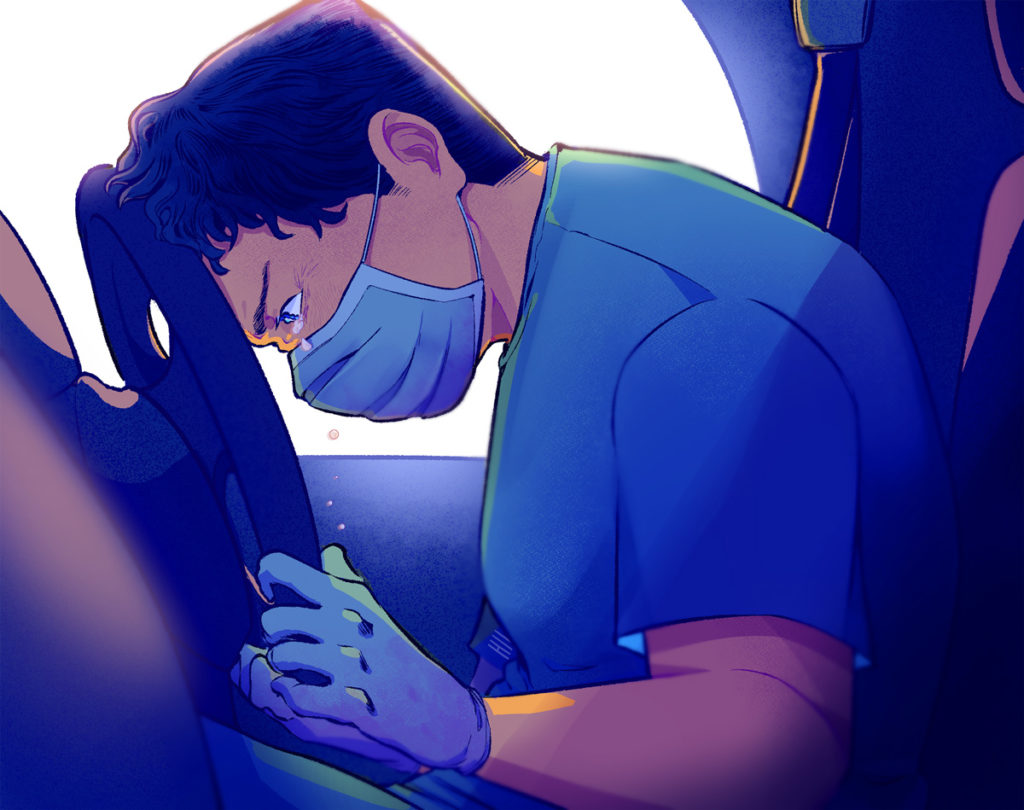Serving Despite Discrimination and Persecution: A Gay Medical Frontliner’s Story
By Malachi Edwin Vethamani

IN THESE DAYS of the COVID-19 pandemic do you wonder who’s behind that mask when you approach a frontliner? Or if you’re a frontliner does it matter to you who comes to you for your assistance? Frontliners are a common presence now. Many are anonymous faces behind masks or voices coming through a phone line. In these difficult times, we look up to these frontliners for their expertise and professionalism. Who are these frontliners?
Do we deserve to live if we save your lives?
This is a story of one Malaysian frontliner from the LGBTQ community. He tells us about what it means to be a gay medical professional in Malaysia. M is a medical officer in a COVID-19 treating hospital. He is mostly involved in the psychosocial support of the patients and staff there. He occasionally needs to treat patients with COVID-19 face-to-face but he mostly provides consultation over the phone to minimise exposure.
M shares an encounter with a patient who had since recovered from COVID-19 and was discharged. The patient reached out for help when he felt discriminated against by relatives. Despite the fact that his family tested negative for COVID-19, everyone else continued to avoid them and took extreme steps to stop them from moving about. M said, “Fortunately, he felt better with our help, and thanked us for listening to his woes.”
The former patient went away but the encounter made a strong impression on M. M knew that the patient was from a religious and conservative background. M reflected:
“Here is a religious man who is revered in the community. But now, he suddenly finds himself experiencing a kind of discrimination I have been subjected to all my life. I can completely relate with what he is going through. But if he knew the person he was looking for support from is gay, would he have continued the conversation?”
The experience of discrimination will pass for his former patient but that will not be the case for M. M had chosen the medical profession because he wanted to help people. He adds, “As cliche as it sounds, it is, at the core, what it means for me. I wanted to do medicine to be equipped with the tools and knowledge to be able to offer care to people who are suffering.” This may well explain M’s willingness to help a patient, regardless of differences in race, religion, gender or sexual orientation. He is not sure how his former patient would respond should he know that the frontliner is gay. He wonders: Would he still thank me? Or would he avoid me the same way he was avoided by his relatives?
Homophobia pervades medical institutions, too
For this patient, his infection recovered, and he could go back to where he was on the social standing again. LGBT people, on the other hand, have to continue to hide and pretend.
Being a closeted gay man, even working among professionals has not been easy for M. He recalls, “I remember sitting in the same room with my superiors (specialists and medical officers when I was a house officer). And we somehow came to the topic of my single status. The specialist asked: “You gay ke?” I tried my best to hide my panic and just smiled. And he said, “‘Jangan main bontot, tak bagus.’ He laughed. I laughed along.” M recognises that his decision to remain in the closet comes with a price. He has lost many opportunities to connect with people. He has to keep his distance emotionally with people.
M adds that he cannot overstate his fear of being outed, even unknowingly, by himself. The fear extends to even hearing the word “gay”. It makes him palpitate, squirm, and he wants to get out of the conversation as soon as he possibly can. He is saddened that even in the medical profession, where he expects people not to be judged for their sexuality, it continues to happen.
“But if you think about it, it’s almost encouraged to be homophobic in Malaysia. It’s actually radical for the straight people to NOT be homophobic. Because then they would be asked questions like ‘How can you be okay with gay people? Are you gay yourself?’”
M fears the damaging consequences on his professional life should he be outed. These range from promotion prospects to even working with paediatric patients as some people wrongly assume that all gay people are paedophiles. Although his fears are real and people might very well deny his very existence, M remains optimistic. He believes in “First, do no harm,” and to “help everyone regardless of whether they are our favourite people or not.” M says, “I am a realistic person. I have very little hopes as to how Malaysia can change and accept and include the LGBTQ community.” In spite of all that he has experienced, M hopes that one day he can live his authentic self in public. M adds, “I hope I can exist as a gay man without fear of discrimination.”
~ ~ ~ ~ ~ ~
This article is based on a respondent’s statements to a survey conducted by Queer Lapis. Details about the patient have been changed to protect him.
Malachi Edwin Vethamani explores the fluidity of identity, race, gender and sexuality in his fiction and poems. He just retired as Professor of Modern English Literature, after 40 years in academia.

